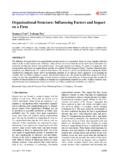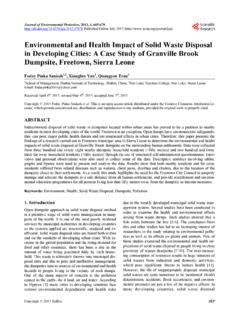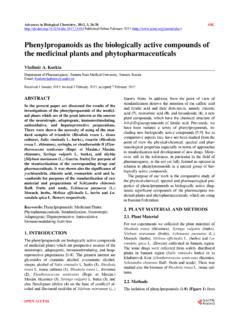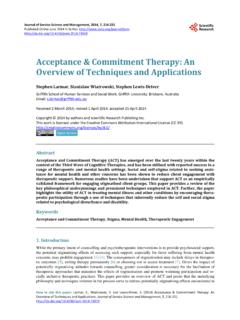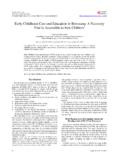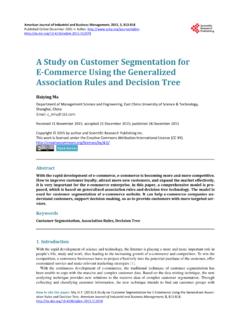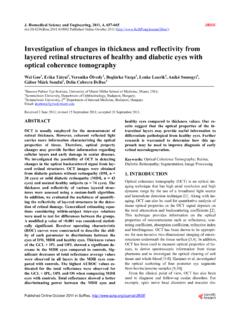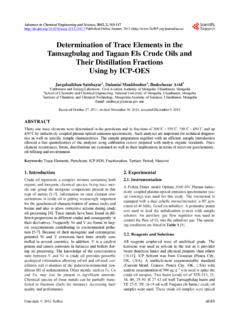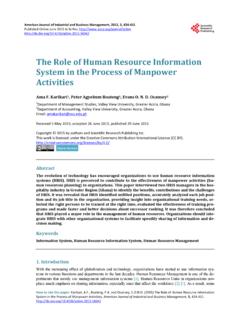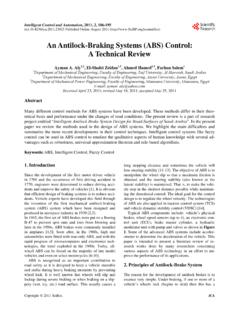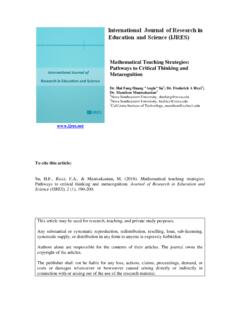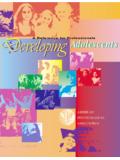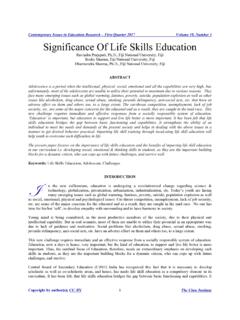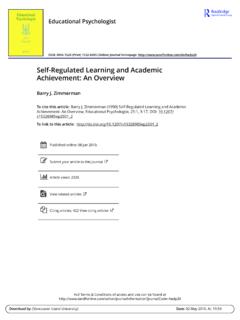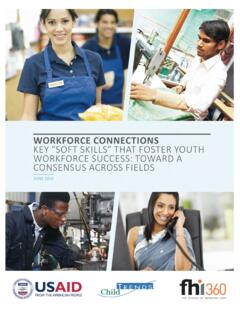Transcription of The Impacts of Physical Exercise on Stress Coping and Well ...
1 Health, 2014, 6, 2570-2580 Published Online November 2014 in SciRes. How to cite this paper: Kim, and McKenzie, (2014) The Impacts of Physical Exercise on Stress Coping and Well- Being in University Students in the Context of Leisure. Health, 6, 2570-2580. The Impacts of Physical Exercise on Stress Coping and Well-Being in University Students in the Context of Leisure Jong-Ho Kim*, Larry A. McKenzie Department of Health Education and Recreation, Southern Illinois University, Carbondale, IL, USA Email: Received 23 August 2014; revised 10 October 2014; accepted 26 October 2014 Copyright 2014 by authors and Scientific Research Publishing Inc.
2 This work is licensed under the Creative Commons Attribution International License (CC BY). Abstract This study aims at investigating the in-depth information regarding Impacts of Physical Exercise on psychological well-being in university students with an emphasis on Coping with Stress in the context of leisure. A qualitative research, based on interview to draw findings in an inductive way, was conducted. Nine university students (N = 9) in a large mid-west university took part in a face- to face, semi-structured interviews using ten open-ended questions with respect to benefits of lei- sure time Physical Exercise .
3 The interview on the basis of phenomenological research examined what the participants experienced with leisure time Physical Exercise in conjunction with Stress Coping and mental health. Meaningful units of themes were induced with 24 initially drawn themes. These themes were reduced to 8 comprehensive constituent themes: self -efficacy, positive emotion, mind and body, health-behaviors, self - esteem , leisure, problem-focused Coping , and pos-itive expectancy. These reduced themes were finally boiled down to 6 integrated themes: positive emotion, unity of mind and body, heightened self - esteem , leisure, problem-focused Coping , and self -regulation of health behavior.
4 This research may shed a light in illuminating potential me-chanism of how regular Physical Exercise is conducive to enhanced health behavior as well as ef-fective Stress Coping in university students in the context of leisure. In particular, this research appears to be meaningful in suggesting that regular leisure-time Physical Exercise can lead to an effective problem-focused Coping through elicitation of positive emotion. Keywords Physical Exercise , Leisure, Positive Emotion, Stress Coping , and Well-Being *Corresponding author.
5 J. -H. Kim, L. A. McKenzie 2571 1. Introduction The mental health issue among university students has been growing public health implications with the high rates of depression, anxiety, and Stress among university students. These mental health problems interfere with educational attainment, health development, social relationships, and quality of lives in the young adults [1]. Alcohol use disorder substantially increases among college students as compared to non-college aged youth counterparts [2].
6 Furthermore, suicide is the third leading cause of death among individuals aged 10 - 24 years old in the and the second commonest cause of death for young people between 15 - 34 years in Europe [3] [4]. In particular, university students are vulnerable to suffering from mental health problems due to their con-cerns regarding studies and their transition toward independence in emerging adulthood [5]-[7]. Nearly 60 per-cent of college students reported they had high levels of Stress , anxiety, and depression [8] [9].
7 However, there has been a lack of Stress Coping skills among university students and many students tend to use ineffective Stress Coping methods [2] [10]-[12]. There has been numerous research studies conducted on benefits of Exercise for mental health by supporting the theory that Exercise is conducive to enhancing positive emotion such as vigor, pleasure, and energy as well as decreasing anxiety, tension, tiredness and anger [13] [14]. Also, a meta-analysis research finding corroborates that Exercise contributes to enhancing mental health and buffering negative impact of Stress [15].
8 People who engage in Physical Exercise are likely to have fewer Stress symptoms and more psychological well-being than those who do not [16] [17]. Leisure, which is a broader context than Physical Exercise , is defined as an intrinsically motivating and self - endorsed activity in freer context in a person s life by pursuing enjoyment, self -expression, and meaningful en-gagement [18]. Active leisure is characterized by requiring some degree of Physical exertion while passive lei-sure is associated with restful, recuperative, and quiet activity such as watching television, and listening to music.
9 Social leisure which is neither active nor passive indicates leisure activity involving social interaction such as attending parties or clubs [19]. Leisure renders people an opportunity to experience flow which is referred to as a totally absorbed feeling, unaware of passage of time during engaging in leisure due to skill development, matching with challenge. Also, leisure contributes to building autonomy, social relationships, and optimism which enhance Stress Coping resources and personal well-being in the context of self -Determination Theory in which intrinsic motivation leads to psychological well-being by enhancing competence, relatedness, and au-tonomy [18] [20] [21].
10 In addition, leisure eliciting positively-toned emotion contributes to not only breathers from Stress but also involvement in pleasurable activity, which functions as an effective Coping method in taxing situations. This positively-toned emotion, elicited from leisure, can restore hope or self - esteem , which buffer the deleterious Impacts of Stress [22]. Furthermore, Kieiber et al. [22] points out that positively-toned emotion leads to cognitive reappraisal in the face of Stress . Coping refers to a kind of behavioral or cognitive response or strategy to prevent or alleviate Stress [23].
